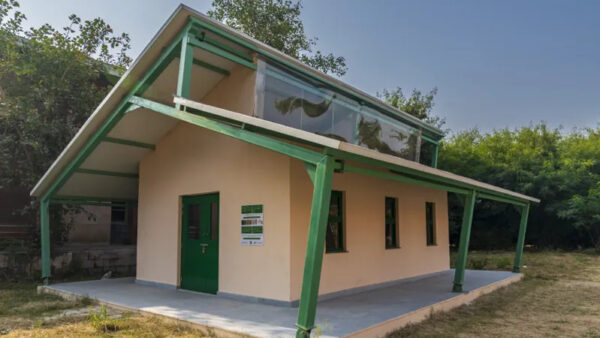A leading research institute in Germany has begun working on ways to re-engineer the molecules of materials in order to recycle those that are currently considered unrecyclable, such as concrete, treated timber and some types of glass.
Experts from Fraunhofer-Gesellschaft are developing a range of techniques together called “Molecular Sorting”, which they hope will help Germany become less dependent on expensive, imported raw materials.
“The separation processes take place initially at the smallest level required – that is, we go down to the molecular or even atomic levels,” said the project’s coordinator, Professor Jörg Woidasky.
While demolition produces millions of tons of concrete rubble every year, it can be crushed and recycled only as aggregate, and much ends up in landfill.
A process for the complete recycling of concrete doesn’t exist yet, Fraunhofer says, and its researchers in the Concrete Technology group want to change that.
They are working on “electrodynamic fragmentation”, a technique of sending ultra-short lightning bolts through the concrete, and they say they have been successful in separating concrete into its individual components – gravel and cement.
Glass, wood and more
Fraunhofer comprises multiple research institutes, and researchers from the Fraunhofer Institute for Silicate Research in Würzburg are working on a process to extract valuable colourless glass from old plate glass.
So-called “water-white” glass has high-grade transparency and is needed for photovoltaics, fiber optic cables, and displays. Any impurities, such as iron, compromise this transparency.
Conventional plate glass could be a source but it has too much iron in it, so researchers are developing a process by which iron atoms can be pulled directly out of the liquid glass if heated to 1,500 degrees Celsius.
“The growth in the photovoltaics sector is so huge at the moment that neither the sources of iron-free natural raw materials, nor the quantities of recycled materials from used photovoltaic modules, are sufficient to satisfy the demand for highly transparent plate glass in the coming decades,” said silicate research leader Dr. Jürgen Meinhardt.
Recycling wood in Germany is in its infancy, Fraunhofer says – currently only about 33% of the roughly eight million tons of waste wood annually is re-used.
Germany’s regulations are partly to blame. They say that materials coated with organic compounds containing halogens, or wood treated with wood preservatives, can’t be re-used except under certain circumstances.
To recycle more scrap wood, Fraunhofer believes it will be useful to identify the harmful substances, so researchers at the Fraunhofer Institute for Wood Research in Braunschweig use processes such as near-infrared spectroscopy, X-ray fluorescence analysis and ion mobility spectrometry.
Once the harmful substance has been identified, it can also be removed.
“Super-critical fluids can be used to clean wood that has been treated with organic wood preservatives,” says physicist Peter Meinlschmidt. “To separate out or concentrate heavy metals we plan to apply wet chemical processes as well as combustion techniques and pyrolyzation.”
Various other Fraunhofer institutes are using the “molecular sorting” approach to isolating precious metals, and even elements such as germanium, zinc, and phosphorus from garbage incinerator flue gases.
World-wide, Fraunhofer says, approximately 70 billion tons of raw materials are extracted annually, twice the quantity extracted at the end of the 1970s.
Germans themselves consume 200 kilograms of raw materials per person per day, according to the Federal Ministry of the Environment, which makes Germany a high resource-user.
In a statement Fraunhofer said: “This not only damages the environment – it is also dangerous for Germany’s international competitiveness. One way to have enough materials available for manufacturing new goods in future is to recycle continually.”
“As a country poor in raw materials, Germany must commit to comprehensive resource conservation,” the institute said.
Fraunhofer researchers will be presenting their results at the IFAT Trade Fair in Munich next week.






